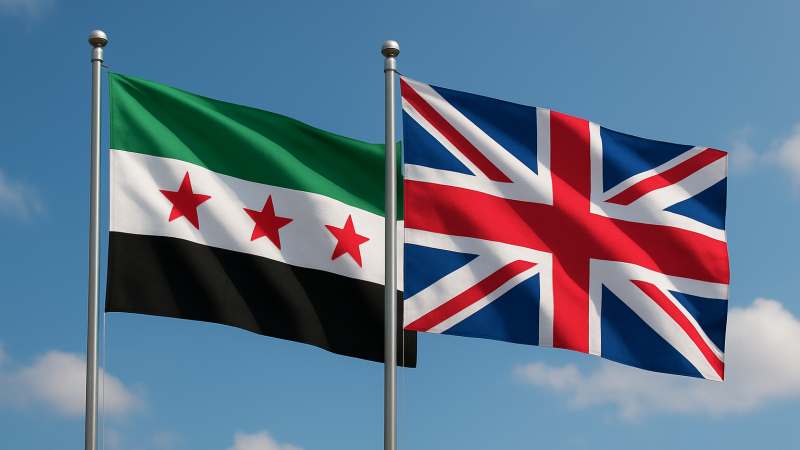Anglo-Libyan Business Association – a rising partner for investment and progress

By Daniel Kawczynski
My family’s connection to Libya dates back to 1977, when members of my family were sent by the Polish Communist government to work in Tripoli. My uncle, employed by Poland’s largest state-run agricultural machinery manufacturer, was seconded there as part of a broader strategy by Communist regimes to curry favour with the Arab world. It was common at the time for engineers and specialists to be deployed across the region to support large-scale infrastructure projects.
I later served as a Conservative MP in the British Parliament for twenty years, and during that time, I was the only Member to have been born under a Communist regime. Under that Orwellian system, food was scarce, everything was rationed, and people queued for hours for basic necessities. Meanwhile, Communist Party elites had access to private shops stocked with imported Western goods, purchasable only in US dollars. My uncle and aunt would send us crates of Libyan oranges, fruit we had never seen before in Poland. I brought them to school where we ate them, made marmalade from the peel, sketched them in our exercise books, and studied maps to find out more about Libya. To us, it was a place of unimaginable abundance, a Garden of Eden. Those early childhood memories left a lasting impression on me and sparked a lifelong affection for Libya and its people.
When I became an MP in 2005, I established the Libya Friendship Group in the House of Commons and led two parliamentary delegations to Tripoli during the Gaddafi era. I strongly opposed Tony Blair’s policy of bringing Gaddafi in from the cold. I believed this rapprochement failed to resolve longstanding grievances between our nations, rooted in decades of repression, state-sponsored terrorism, and diplomatic hostility.
One of my most significant efforts was bringing the family of PC Yvonne Fletcher, the police officer murdered by a Libyan diplomat during a peaceful demonstration outside the Libyan People’s Bureau in St James’s Square in 1984, to meet then Foreign Secretary David Miliband. Sadly, justice was never served. Her killer was never identified nor brought back to Britain to stand trial.
In frustration, I wrote Seeking Gaddafi, published in February 2010, exactly one year before Libya’s revolution began. The book documented the West’s unresolved concerns about the regime, including the Lockerbie bombing, the worst terrorist attack on British soil since the Second World War, and Gaddafi’s support for the IRA, including his provision of Semtex explosives used during the campaign of terror across Britain in the 1980s.
I was leading a parliamentary delegation in Tunis in January 2011 when signs of unrest began. Just four days after we left, Ben Ali fled Tunisia and the Arab Spring swept the region. Britain intervened in Libya. Gaddafi’s outdated Soviet-supplied tanks and radar systems were quickly dismantled. David Cameron was welcomed as a hero in Benghazi. However, due to a lack of meaningful post-intervention planning, the UK withdrew just as swiftly as it had arrived. Libya soon descended into a brutal civil war, leaving countless cities devastated and lives lost.
The establishment of ALBA, the Anglo-Libyan Business Association, marks a fresh beginning. Our inaugural event on 24th June will signal a new era in Anglo-Libyan relations, driven by the younger generation of British Libyans. The easing of travel restrictions, particularly in the East, has boosted confidence among investors and corporations. It is ALBA’s task to harness that momentum.
ALBA is led by a balanced team of British Libyans with roots on both sides of the country. Our COO, Suhaib Adam, is from Benghazi, while our CFO, Hesham Karim, hails from Tripoli. This dual representation is critical in ensuring commercial unity, avoiding regional exclusion, and promoting economic collaboration across Libya. Many Libyan businesses already operate internationally, and ALBA’s composition reflects this diversity.
Our mission is to revitalise UK–Libya trade in a way that remains authentic to the Libyan people and forward-thinking for the UK. ALBA will facilitate high-level engagement between Libyan and British stakeholders through practical, industry-led workshops and strategic dialogue.
As the House of Lords debates the potential use of £4 billion in frozen Libyan assets, some of which could be directed towards IRA victims, it is vital that Libyan business leaders are given access to speak openly with peers in Parliament. They deserve the opportunity to present new proposals and articulate a fresh vision for Libya.
Benghazi, long regarded as Libya’s intellectual and cultural capital, is undergoing rapid economic change. The Reconstruction Fund of Libya has driven major development projects, such as the new Benghazi Stadium and the Hawari Hospital. Yet Britain has lagged behind, failing to properly recognise the improved security landscape, particularly in the East. The societal shift underway in Libya reflects a strong appetite for global commerce. The uncertainty and caution of the past, rooted in civil war and instability, is giving way to confidence and capability.
The formation of ALBA comes at precisely the right time. Libya’s security environment is improving and investor confidence is growing. The United States has already moved forward. Weatherford Oil Services, a major US firm, has resumed operations in Libya. This is a clear signal that conditions are stabilising and that Western engagement is both feasible and necessary.
A once ‘forgotten nation’:
Libya has endured more than a decade of instability, but now a decisive shift is underway. Once seen as a forgotten nation, Libya is emerging as one of the world’s fastest-growing economies. According to the IMF, Libya is forecast to be the third fastest-growing economy in 2025, with a real GDP growth of 13.5%, compared to a global average of 3.2%. That figure alone underscores Libya’s untapped economic potential. ALBA is committed to helping unlock it.
Deals in Libya increasingly rely on structured contract agreements, which promote transparency and accountability for all parties. A new business culture boom is beginning to take hold, fuelled by regional stability and a corresponding drop in insurance risk for British firms.
Culturally, Libya is at a turning point. Years of stagnation have produced a powerful hunger for change. The Libyan people are eager to engage with British businesses, but until recently this was hindered by travel bans and financial restrictions, forcing many UK firms to broker deals outside of Britain. Those obstacles are now receding. The UK has the financial instruments in place to facilitate transactions from Libya, and these developments will be central to our forthcoming event.
Let us be clear. Outsourcing trade to the EU was not what the British people voted for in 2016. The UK must now strengthen direct bilateral ties, and Libya presents a timely and promising opportunity.
The creation of ALBA reflects the lesson I learnt in my twenty years in Parliament. Well-organised, forward-facing associations, when aligned with government bodies, can reshape policy, correct perception, and create tangible opportunities. Through ALBA, we aim to do just that, helping to reframe Libya not as a risk but as a rising partner for investment, partnership, and progress.
By Daniel Kawczynski
Chairman of ALBA






